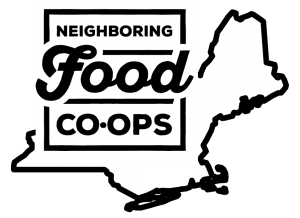
Your Neighboring Food Co-ops
Locally Owned by More Than
168,000 People Like You!
- Slash Your Trash & Act Now for Earth Month
- Northeast Family Farm Partnership
- Operationalizing the Co-op Identity
- Our Collective Impact
- Co-op Innovation Award
- Welcome New General Managers!
- April’s Cave to Co-op Artisan Cheese
- Co-op Jobs!
- Farmers Union: Addressing Food System Consolidation
- Co-op Calendar
Slash Your Trash & Act Now for Earth Month

Act Now for climate justice! Join members of food co-ops across the Northeast in pledging to reduce waste and ‘Slash Your Trash’ during the Month of April — the 52nd Anniversary of Earth Day in the U.S.
Did you know that the 292 million tons of waste (nearly 1,800 pounds per person every year) generated in the US in 2018 was primarily made up of plastics, paper, paperboard, and food? As individuals, we can take basic steps to reduce our waste. And working together with our co-ops as a community, we can have a big collective impact!
When you shop at your local food co-op, you are helping to build a more inclusive economy and a stronger, more sustainable community. And as a co-op member, you are part of a movement of more than one billion co-operators around the world working to build a better world for everyone.
Join your local Food Co-op and co-op members across our region to Slash Your Trash! We are excited that 15 of our member food co-ops are participating. Find a food co-op near you https://nfca.coop/members and:
- Pledge to take at least one of the actions to Slash Your Trash.
- Share Your Experience! Use “#SlashYourTrash”, “#NeighborCoops” and “#ActNow” and tag your local food co-op in social media posts letting friends know what you are doing.
- Visit the United Nations #ActNow Webpage and let them know about the actions you are taking on Climate Change: https://www.un.org/en/actnow/
At your local food co-op, you are working with your neighbors to create change together, strengthening food security, building a more inclusive economy, and growing ecological sustainability. For example, an average of 25% of sales at your Neighboring Food Co-ops are sourced from local producers. You can also find organic products that support healthy soils, buy in bulk to help reduce packaging waste, and “Go Co-op” by choosing products from co-ops that empower workers and producers. Together, co-op members are supporting Healthy Food Access programs that are making healthy food and co-op membership more accessible and contributing to community organizations through round up at the register efforts.
During the month of April, your Neighboring Food Co-ops are sharing some of the ways that co-op members are working together to work to build a better future for everyone. Here are some examples from food co-ops across the region to give some inspiration:
- Blue Hill Co-op in Maine kicked off Earth Month in partnership with ReVision Energy and a Climate Classroom, and music and activities
- Buffalo Mountain Food Co-op in Hardwick, VT, hosts Sustainability Sundays for their members and shoppers to bring in their own containers and save 10% on all bulk liquids (such as oils, maple syrup, balsamic vinegar, vanilla, dish and laundry soaps, shampoo, and conditioners)
- Cambridge Food Co-op in New York State is hosting a Co-op clean up of their adopted road in honor of Earth Month
- City Market/Onion River Co-op in Burlington, VT, will be giving away 18,000 free reusable bags during Earth Week, an annual event at the Co-op!
- Monadnock Food Co-op in Keene, NH, is hosting a virtual Earth Day Film Festival for their region
- Old Creamery Co-op in Cummington, MA, has dedicated space for the Hilltown Sustainability Library, a collection of books, videos and other resources for living ecologically responsible lives.
- Willimantic Food Co-op shows shoppers how to Shop Bulk and Slash our Trash with this super fun short video.
As democratically governed, community-based businesses, co-ops are designed to meet member needs and goals rather than maximizing short-term profits and focus on social and environmental priorities through their purchasing priorities, operational practices, and community education activities. Through its “Co-ops for 2030” campaign, the International Co-operative Alliance has committed the movement to supporting the United Nations’ Sustainable Development Goals (SDGs), which seek to build shared peace and prosperity for people and the planet, now and into the future.
So, Slash Your Trash at your local food co-op this month to help reduce waste, help the Earth and be entered to win raffle prizes!
Find out more at https://nfca.coop/slashyourtrash/
Northeast Family Farm Partnership
The Neighboring Food Co-op Association was the first retailers’ organization to sign on to the Northeast Family Farm Partnership, supporting dairy farmers in our region that have lost their contracts. 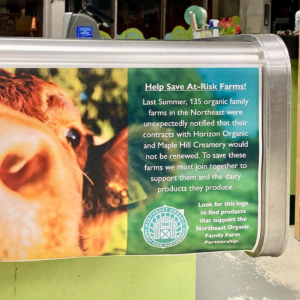
Last fall, 135 organic dairy farms in our region received word that their contracts would not be renewed. In response, Stonyfield Organic co-founder Gary Hirshberg launched the Northeast Family Farm Partnership to encourage consumers to increase their purchases of organic dairy brands that are committed to purchasing from local farms. The goal is to provide area farmers with the demand they need to remain financially viable. The Neighboring Food Co-op Association (NFCA) was the first grocery retailers’ organization to sign on to the partnership, encouraging its member food co-ops to participate.
“Our members are already very aligned with the goals of the Partnership,” says NFCA Executive Director Erbin Crowell. “And this effort offers another opportunity for us to reinforce our support of our region’s family farms.”
As part of their support of the Partnership, a growing number of food co-ops across New England and New York State are encouraging their members and customers to purchase one-quarter of their weekly dairy products from participating local organic brands and take a pledge to that effect on the Partnership’s website, at www.saveorganicfamilyfarms.org. More than 2,500 consumers have taken the pledge to date, says Olga Moriarty, Northeast Organic Family Farm Partnership Executive Director.
“We know that our co-ops and their members and shoppers are passionate about supporting family farms and we are continually impressed with the dedication and care shown by our co-ops in purchasing from regional producers,” says Suzette Snow-Cobb, NFCA Sourcing Coordinator.
To date, 17 NFCA member food co-ops have signed on to the partnership including Blue Hill Co-op (ME), Brattleboro Food Co-op (VT), Fiddleheads Food Co-op (CT), Franklin Community Co-op (MA), Hanover Co-op Food Stores (NH & VT), High Falls Food Co-op (NY), Hunger Mountain Co-op (VT), Littleton Food Co-op (NH), Middlebury Natural Foods Co-op (VT), Monadnock Food Co-op (NH), Plainfield Food Co-op (VT), Portland Food Co-op (ME), Putney Food Co-op (VT), River Valley Co-op (MA), Upper Valley Food Co-op (VT), Willimantic Food Co-op (CT), and Wolfeboro Food Co-op (NH).
Take Action: Your food co-op can take action by signing on to the Northeast Organic Family Farm Partnership as a retailer partner and individuals can take action as well by signing the consumer pledge to increase their purchases of regionally-produced organic dairy products. For more information, e-mail Suzette at Suzette@nfca.coop.
Image from Fiddleheads Food Co-op, New London, CT.
Operationalizing the Co-op Identity
Executive education training offers strategies for leveraging the Co-operative Identity for impact and business success.
On April 5-6, more than 40 participants gathered for an engaging online course on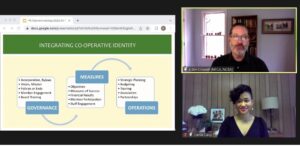 “Operationalizing the Co-operative Identity,” presented by the International Centre for Co-operative Management at Saint Mary’s University. Designed for decision-makers including staff and directors from across co-op sectors, the two-day course offered presentations, tools, and opportunities for networking and sharing ideas with other leaders on how a focus on the Identity can contribute to impact and success.
“Operationalizing the Co-operative Identity,” presented by the International Centre for Co-operative Management at Saint Mary’s University. Designed for decision-makers including staff and directors from across co-op sectors, the two-day course offered presentations, tools, and opportunities for networking and sharing ideas with other leaders on how a focus on the Identity can contribute to impact and success.
Presenters include Karen Miner and Dr. Sonja Novkovic (International Centre for Co-operative Management), Fred Freundlich (University of Mondragón), and Erbin Crowell (Neighboring Food Co-op Association). Case studies were supplemented by interviews with Jerry McGeorge, Executive Vice President of People at Organic Valley, on centering the Identity as an organization grows and evolves, and Dãnia Davy, Director Land Retention & Advocacy at the Federation of Southern Cooperatives / Land Assistance Fund, on the role of co-ops in the struggle for Civil Rights in the South and the importance of co-operative associations working together to advance racial and economic justice today.
“The course provided me with a deeper understanding of how we can operationalize our Co-operative Identity in our everyday work at the co-op,” said Sue Miller, Co-General Manager of Upper Valley Food Co-op (VT). “I also got a clearer understanding of the value of the Co-operative Balanced Scorecard as a tool for planning and analyzing sustainability and resilience.”
Food co-ops from the Northeast participating in the training to date have included Portland Food Co-op (ME), Putney Food Co-op (VT), Upper Valley Food Co-op (VT), Willimantic Food Co-op (CT), and GreenStar Food Co-op (NY). Other participants included co-ops from across sectors and around the world.
“It was a great course,” said Marilyn Chase, Council President of GreenStar. “We were reminded to re-evaluate why we exist and how we can continue to grow in the expression of our values.”
The Neighboring Food Co-op Association (NFCA) partners with the International Centre for Co-operative Management at Saint Mary’s University to support quality education and training on the co-operative business model. To learn more about the Centre’s programs and offerings, visit https://ManagementStudies.coop.
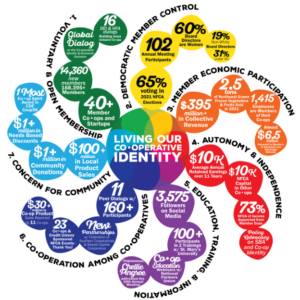 significant collective impact of our co-ops for their communities in 2021.
significant collective impact of our co-ops for their communities in 2021. Co-operatives are invited to apply for the 2022 Co-op Innovation Award, supporting development in communities of color and historically disinvested communit ies
ies
National Cooperative Bank (NCB), in partnership with Capital Impact Partners, has launched the 2022 Co-op Innovation Award to advance co-operative development in communities of color and historically disinvested communities. Priority will be given to food, worker, and housing co-ops, but all sectors are invited to apply.
 Co-operatives are an integral part of the fabric of our economy and have real power to transform low-income communities into strong, vibrant places of opportunity. With momentum growing around the power of cooperatives to create economic opportunity for underserved communities and communities of color, Capital Impact Partners created the Co-op Innovation Award in 2015, designed to further this movement and the impact that cooperative organizations are creating nationwide. Organizations are chosen yearly to receive a portion of a $100,000, one-year grant to recognize innovative strategies to increase the number of food, housing, and worker co-ops serving low-income communities.
Co-operatives are an integral part of the fabric of our economy and have real power to transform low-income communities into strong, vibrant places of opportunity. With momentum growing around the power of cooperatives to create economic opportunity for underserved communities and communities of color, Capital Impact Partners created the Co-op Innovation Award in 2015, designed to further this movement and the impact that cooperative organizations are creating nationwide. Organizations are chosen yearly to receive a portion of a $100,000, one-year grant to recognize innovative strategies to increase the number of food, housing, and worker co-ops serving low-income communities.
Chartered by Congress in 1978 and organized in 1981 as a co-operatively owned financial institution, NCB was created to address the financial needs of an underserved market: co-operatively owned organizations that operate for the benefit of their members, not outside investors. Since its founding, NCB has had an uncommon mandate to ensure that its efforts benefit those most in need, supporting low-income communities and the expansion of co-operative initiatives. With this guiding principle, NCB contributes to the building blocks of sustainable communities: investing in clean energy, small businesses, and affordable housing, expanding access to healthy food and affordable health care, plus much more.
As part of its mission of supporting and advocating for America’s cooperatives and their members, especially in low-income communities, by providing innovative financial and related services, NCB has been a long-time partner of the Neighboring Food Co-op Association (NFCA) as we have worked together to grow the co-operative economy in the Northeast.
Please visit Capital Impact Partners website https://bit.ly/3iR4CYk to access the application and register for informational webinars on April 20th and 27th. Letters of intent are due by May 3, 2022. And for more information on NCB, visit https://ncb.coop.
Photo Credit: Co-op Dayton.
Middlebury Natural Foods Co-op and Hanover Consumer Co-operative Society announce new leadership
Earlier this year, the Board of Directors of Middlebury Natural Foods Co-op (VT) named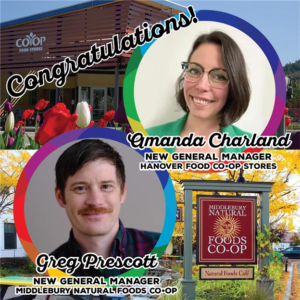 Greg Prescott as its new General Manager following the retirement of Glenn Lower, while the Board at Hanover Co-op Food Stores (NH & VT) announced that Amanda Charland would take on the GM role beginning at the end of April. Both were hired after extensive searches and commended for their commitment to the Co-operative Identity and the success of their organizations.
Greg Prescott as its new General Manager following the retirement of Glenn Lower, while the Board at Hanover Co-op Food Stores (NH & VT) announced that Amanda Charland would take on the GM role beginning at the end of April. Both were hired after extensive searches and commended for their commitment to the Co-operative Identity and the success of their organizations.
Amanda has been with the Co-op since 2012 when she was hired as Sustainability Coordinator. In 2015 she became Director of Member Services and Outreach and is currently Director of Cooperative Engagement. In her time at Hanover, Amanda has initiated programs ranging from waste reduction to marketing tools like value propositions and personas that link the Co-op more closely to its member-owners and shoppers. She has led teams responsible for launching innovative social programs such as Pennies for Change, Double-Up-Food Bucks (a Healthy Food Access program) and the Co-op Car Connects program at the Service Centers. She oversaw quality improvements in the offerings at the Culinary Learning Center. In addition to her Bachelor’s Degree from Marlboro College, Amanda has a Master of Management: Co-operatives & Credit Unions from St. Mary’s University, as well as a Certificate in Non-Profit Management from Marlboro Graduate School. The Co-op, with roughly 350 employees and over 25,000 members, is the second oldest and second largest grocery co-operative in the country. Amanda will be the first woman to lead the Co-op as General Manager in its 87-year history.
Greg began his career in the café at Harvest Co-op in Massachusetts, and he comes to the GM position with comprehensive experience in managing retail grocery operations, and in particular, a career devoted to promoting and selling nourishing, artisanal, and local food. For the last five years, Greg has been Middlebury’s first Store Operations Manager. In his work at Middlebury, Greg has demonstrated a deep commitment to the community, to the Co-op’s Mission and Ends, and to its long-term success. Greg pioneered creative, forward-thinking programs such as reusable containers in the salad bar and reducing plastic water bottles sold in the store—both of which make Middlebury stand out not only among retail grocery stores at large but among food co-ops.
During the COVID-19 pandemic, Greg’s strategic and calm leadership has been essential in keeping our entire community—Co-op staff, member-owners, producers, and shoppers—safe and fed. Greg’s decision-making in the face of supply chain shortages and constantly evolving public health recommendations were described as “bold and thoughtful.”
The Neighboring Food Co-op Association (NFCA) would like to extend our congratulations to Amanda and Greg and our great appreciation for the service and commitment of Paul Guidone, outgoing General Manager at Hanover Co-op Food Stores, and Glenn Lower, retiring GM at Middlebury Natural Foods Co-op.
Hanover Co-op Food Stores and Middlebury Natural Foods Co-op are founding members of the Neighboring Food Co-op Association (NFCA). To learn more, visit their websites at https://coopfoodstore.coop and https://middlebury.coop.
April’s Cave to Co-op Artisan Cheese
Vermont Herdsman, Parish Hill Creamery, Westminster West, VT
Each month our Cave to Co-op partnership between Provisions International and the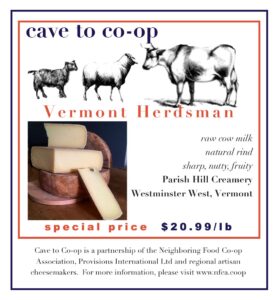 Neighboring Food Co-op Association offers a regionally produced cheese featured at a great price. Strengthening our local and regional farmers and producers by supporting artisanal cheesemakers is a key goal of the Cave to Co-op program.
Neighboring Food Co-op Association offers a regionally produced cheese featured at a great price. Strengthening our local and regional farmers and producers by supporting artisanal cheesemakers is a key goal of the Cave to Co-op program.
April’s artisan cheese is from Parish Hill Creamery who produce seasonal, hand made, raw milk cheeses inspired by the traditional cheeses of Italy. Peter Dixon brings over 30 years of cheesemaking experience and he is joined by his wife Rachel Schaal and sister Alex Schaal. The creamery is the culmination of Peter’s years making cheese, teaching classes, solving problems, and imagining possibilities. Peter, Rachel and Alex love making cheese. They make cheese traditionally, simply, as near to home as possible, and with the highest quality ingredients and results as can be had.
Parish Hill gets milk from Elm Lea Farm at the Putney School, just up the road from the creamery, and the milk is the result of healthy animals grazing lush pastures. Protein and fat are balanced ideally for the cheeses produced, and the cheese changes subtly throughout the season, reflecting the growth and maturation of various pasture plants.
Their starter cultures are made from the milk of four individual cows. Helga, Abigail, Clothilda, and Sonia were chosen for their health, their components, and their disposition. As a result Parish Hill makes mother cultures that are truly an articulation of their milk and the resulting cheese is a revelation of that milk, the cows, the pastures, the water and the land.
Whole milk, long-aged Asiago-style Herdsman is made when the cows are grazing on hillside pastures and aged at least 12 months to develop a full, slightly sharp flavor with hints of pineapple and hazelnuts. The supple interior becomes granular as the cheese ages beyond a year. The straw-colored edible rind is scrubbed weekly when young.
Crispy Potato Stacks with Herdsman, makes 12
- 5-6 skinny baking potatoes – about 5 cups sliced
- 3 T unsalted butter
- 2 T extra-virgin olive oil
- 1 ½ T chopped fresh rosemary
- 1 t crunchy sea salt
- freshly ground pepper
- 4 ounces finely grated Herdsman cheese, plus more for the tops
Directions:
- Pre-heat oven to 375°
- Peel and slice the potatoes very thinly and place in a bowl. A mandolin works well for this!
- Melt the butter with the olive oil, and then stir in the rosemary, salt, pepper and grated Herdsman.
- Pour this over the potatoes and gently toss until they are well coated.
- Lightly butter a 12-cup muffin pan.
- Divide and layer the potato slices evenly between the muffin tins, completely filling them to the top.
- Sprinkle additional cheese and rosemary over the tops, and then a final scatter of sea salt.
- Bake for 40-50 minutes until the potatoes are golden brown and crispy.
- Take them out of the oven and let them sit for five minutes to settle. Remove the potato stacks from the tins and serve.
Each month our Cave to Co-op partnership between Provisions International and the Neighboring Food Co-op Association (NFCA) offers a delicious regional cheese featured at a great price. Strengthening our local and regional farmers and producers by supporting artisanal cheesemakers is a key goal of the Cave to Co-op program.
When you work at your local food co-op, you’re part of something bigger: You’re also helping to grow a more healthy, just & sustainable food system that works for everyone!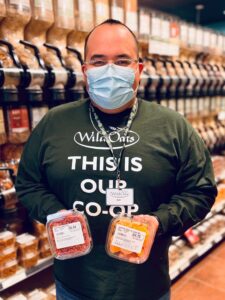
Want to develop new skills, advance your career, and do meaningful work for a business that makes a difference in your community? Come join the co-op team!
From our beginnings, co-ops have been guided by a commitment to shared values of democracy, equality, equity, and solidarity. And across our region, food co-ops have been pioneers in healthy food, sustainable agriculture, and building a more inclusive economy that works for everyone.
Not only is working at your local co-op truly meaningful, it’s also fun working with others who also want to help build a better world. We’d love for you to be part of our co-op community and work to build a more healthy, just, and sustainable food system and a more inclusive economy.
Get more info and to help spread the word: https://nfca.coop/co-opjobs.
Farmers Union: Addressing Food System Consolidation
Legislation introduced in the U.S. Senate would help address rampant corporate consolidation of the food system and meat processing.
“The issue of meatpacker consolidation may not seem relevant here in the Northeast,”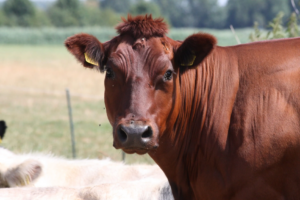 said Roger Noonan, President of the New England Farmers Union. “But for the most common meat cuts available in our region, if you trace them back to the processor, you’re likely to find one of the big four corporations. Only by working together — producers and consumers — will we be able to address this issue of food system consolidation.”
said Roger Noonan, President of the New England Farmers Union. “But for the most common meat cuts available in our region, if you trace them back to the processor, you’re likely to find one of the big four corporations. Only by working together — producers and consumers — will we be able to address this issue of food system consolidation.”
One solution is the Cattle Price Discovery and Transparency Act of 2022, recently introduced under the leadership of Senators Jon Tester (D-MT), Chuck Grassley (R-IA), Deb Fischer (R-NE), and Ron Wyden (D-OR). The bill is a revised version of similar legislation introduced last year. As with the 2021 version, National Farmers Union (NFU) supports the bill and urges Congress to act quickly to pass this critically important legislation.
“Rampant consolidation in the cattle industry has made pricing in the cattle market increasingly opaque,” said NFU President Rob Larew. “Fair and competitive markets rely on price discovery and transparency. For farmers and ranchers to bargain effectively with packers, they need access to reliable, accurate pricing information. This bill would shed light on the market and bring about greater fairness.
“NFU thanks Senators Tester, Grassley, Fischer, and Wyden for their continued leadership on this issue. The bill improves upon the version from November 2021, and we encourage swift action by the Senate and House on this legislation.”
The Cattle Price Discovery and Transparency Act of 2022 makes important reforms, including:
- Establishing mandatory minimum purchase volumes for packers through “approved pricing mechanisms” based on five to seven geographic regions, to be determined by the U.S. Department of Agriculture.
- Bringing more transparency by requiring reporting of cattle weights and slaughter deliveries two weeks in advance.
- Clarifying and implementing a cattle contract library.
- Increasing penalties for violations by packers.
- Requiring livestock mandatory reporting data be made consistently available.
Further details about the bill from the cosponsors are available here. The full text of the bill is available here.
You can support our family farmers by encouraging your Senators and Representatives to co-sponsor the Cattle Price Discovery and Transparency Act of 2022 – and lending your voice by joining the New England Farmers Union!
Our Local Farmers & Fishermen Need You!
Do you care about where your food comes from and want to support the people who produce it? Join the NEFU as a Friend of the Farmer for just $15. Your membership will help ensure that our region’s producers and consumers are heard by policy makers here at home and in Washington, DC. For more information, please visit www.newenglandfarmersunion.org.
Find More Co-op Events: https://nfca.coop/calendar
The Neighboring Food Co-op Association (NFCA) is a co-operative federation of over 40 food co-ops and startup initiatives across New England, working together toward a shared vision of a thriving co-operative economy, rooted in a healthy, just, and sustainable food system and a vibrant community of co-operative enterprise.


